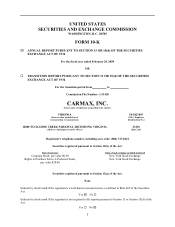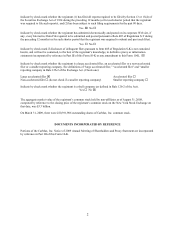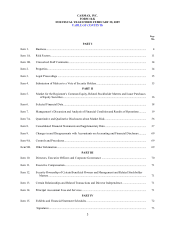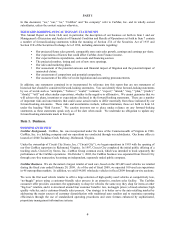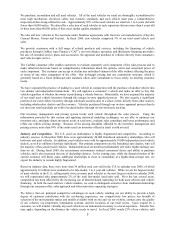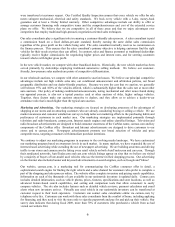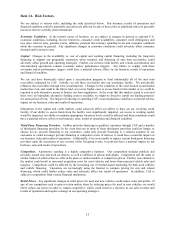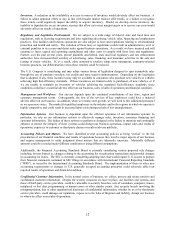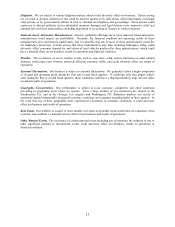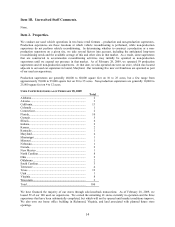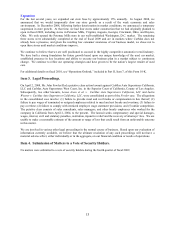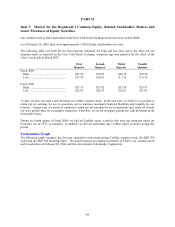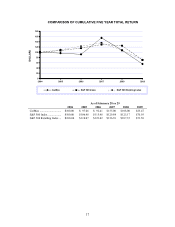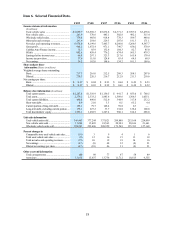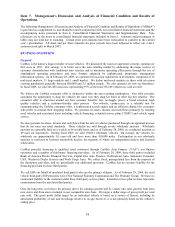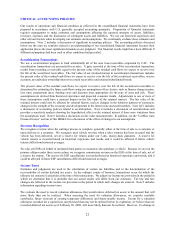CarMax 2009 Annual Report Download - page 17
Download and view the complete annual report
Please find page 17 of the 2009 CarMax annual report below. You can navigate through the pages in the report by either clicking on the pages listed below, or by using the keyword search tool below to find specific information within the annual report.11
Item 1A. Risk Factors.
We are subject to various risks, including the risks described below. Our business, results of operations and
financial condition could be materially and adversely affected by any of these risks or additional risks not presently
known or that we currently deem immaterial.
Economic Conditions. In the normal course of business, we are subject to changes in general or regional U.S.
economic conditions, including, but not limited to, consumer credit availability, consumer credit delinquency and
loss rates, interest rates, gasoline prices, inflation, personal discretionary spending levels and consumer sentiment
about the economy in general. Any significant changes in economic conditions could adversely affect consumer
demand and/or increase costs.
Capital. Changes in the availability or cost of capital and working capital financing, including the long-term
financing to support our geographic expansion, when resumed, and financing of auto loan receivables, could
adversely affect growth and operating strategies. Further, our current credit facility and certain securitization and
sale-leaseback agreements contain covenants and/or performance triggers. Any failure to comply with these
covenants and/or performance triggers could have a material adverse effect on our business, results of operations
and financial condition.
We use and have historically relied upon a securitization program to fund substantially all of the auto loan
receivables originated by CAF. Initially, we sell these receivables into our warehouse facility. We periodically
refinance the receivables through term securitizations. Changes in the condition of the asset-backed securitization
market have led, and could in the future lead, us to incur higher costs to access funds in this market or we could be
required to seek alternative means to finance our loan originations. In the event that this market ceased to exist and
there were no immediate alternative funding sources available, we might be forced to curtail our lending practices
for some period of time. The impact of reducing or curtailing CAF’ s loan originations could have a material adverse
impact on our business, sales and results of operations.
Disruptions in the capital and credit markets could adversely affect our ability to draw on our revolving credit
facility. If our ability to secure funds from the facility were significantly impaired, our access to working capital
would be impacted, our ability to maintain appropriate inventory levels could be affected and these conditions could
have a material adverse effect on our business, sales, results of operations and financial condition.
Third-Party Financing Providers. CarMax provides financing to qualified customers through CAF and a number
of third-party financing providers. In the event that one or more of these third-party providers could no longer, or
choose not to, provide financing to our customers, could only provide financing to a reduced segment of our
customers or could no longer provide financing at competitive rates of interest, it could have a material impact on
our business, sales and results of operations. Additionally, if we were unable to replace current third-party financing
providers upon the occurrence of one or more of the foregoing events, it could also have a material impact on our
business, sales and results of operations.
Competition. Automotive retailing is a highly competitive business. Our competition includes publicly and
privately owned new and used car dealers, as well as millions of private individuals. Competitors sell the same or
similar makes of vehicles that we offer in the same or similar markets at competitive prices. Further, new entrants to
the market could result in increased acquisition costs for used vehicles and lower-than-expected vehicle sales and
margins. Competition could be affected by the increasing use of Internet-based marketing for both used vehicles
and vehicle financing. Customers are increasingly using the Internet to compare pricing for cars and related
financing, which could further reduce sales and adversely affect our results of operations. In addition, CAF is
subject to competition from various financial institutions.
Retail Prices. Any significant changes in retail prices for used and new vehicles could reduce sales and profits. If
any of our competitors seek to gain or retain market share by reducing prices for used or new vehicles, we would
likely reduce our prices in order to remain competitive, which could result in a decrease in our sales revenue and
results of operations and require a change in our operating strategies.


